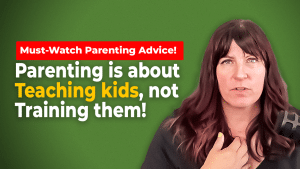
As a parent, I’ve always believed that how we approach our children’s behavior shapes not only their present but also their future. I’ve found myself, like many of you, navigating temper tantrums, emotional outbursts, and the ever-challenging transitions that seem to throw everything into chaos. It’s during these moments that we, as parents, have to decide how we respond. And for a long time, I thought the answer was simple: punishment.
In college, I was all in on behaviorism. I was taught behavior management by Ernest Vargas, the son-in-law of B.F. Skinner, who pioneered operant conditioning. I was fascinated by the idea that through positive or negative reinforcement, we could “train” behaviors. In a lab, this theory worked perfectly—stimulus, response, reinforcement. It was logical, clean, and made perfect sense to the analytical part of my brain.
But when I entered the real world, the classroom, and later my own home, this rigid way of managing behavior didn’t hold up. I quickly realized that children aren’t like lab animals; they’re far more complex. Their behaviors are not just responses to stimuli—they’re a form of communication. And as much as I tried to apply what I’d learned, it quickly became clear that punishment, or even reward-based systems, often led to short-term compliance, but not long-term growth.
I started to wonder: why do we think punishment is the answer to bad behavior? Why do we expect consequences to teach, when what children really need is guidance?
That question changed my entire approach to parenting. It became less about managing behavior and more about teaching through connection, curiosity, and understanding. My focus shifted from trying to mold behavior to trying to understand what was behind the behavior. What were my kids trying to tell me? What was going on emotionally that caused the outburst? When I looked at it this way, I began to see that what my kids needed was not more discipline, but more of my attention, patience, and empathy.
Over time, I’ve come to believe that effective parenting is built on three key principles: grace, curiosity, and grit.
Grace for Ourselves and Our Children
Parenting is hard. There’s no handbook, no step-by-step guide, and no perfect way to do it. We’re human, and we make mistakes. One of the most important things I’ve learned is to give myself grace—space to be imperfect and to learn from my own missteps without beating myself up. I also extend that same grace to my children. They’re learning, too, and their behavior is often a reflection of what they’re going through inside, not a sign that they’re bad kids or that I’m a bad parent.
Giving ourselves grace means accepting that we’re going to get it wrong sometimes, and that’s okay. It’s about letting go of perfectionism and embracing the fact that parenting is as much a journey for us as it is for our children.
Curiosity Instead of Judgment
When I began to approach my kids’ behaviors with curiosity rather than judgment, everything changed. Instead of reacting to the behavior itself, I started asking, “What is my child trying to tell me through this behavior?” When I stay curious, I’m less likely to get angry or frustrated, and more likely to engage with them in a meaningful way.
Curiosity allows me to see their outbursts, tantrums, or defiance not as personal attacks or signs of failure, but as moments where they’re trying to communicate something they can’t yet articulate. By staying curious, I can help them process their emotions and guide them to better ways of expressing themselves.
Grit to Persevere
Let’s be real—parenting is tough. It requires resilience and the willingness to keep going, even when things feel impossible. There are days when everything seems to go wrong, when our patience runs out, and when we question whether we’re doing anything right. But those are the moments when grit kicks in.
Grit is what allows me to pick myself up after a hard day, apologize when I’ve made a mistake, and try again the next day. It’s what keeps me from giving in to the urge to yell or punish out of frustration. Instead, I dig deep and remind myself that my goal is not to control my kids, but to guide them. It’s a long game, but the reward is building a relationship based on mutual respect, understanding, and growth.
Parenting Is About Teaching, Not Training
Ultimately, I’ve learned that my role as a parent is not to train my children to behave a certain way, but to teach them how to navigate the world with confidence, empathy, and resilience. Children are not blank slates or lumps of clay for us to mold—they are individuals with their own personalities, needs, and challenges. Our job is to help them grow into the best versions of themselves, not through punishment, but through connection, teaching, and guidance.
I don’t claim to have it all figured out, but I do know that shifting my focus from punishment to teaching has transformed not only my relationship with my children but also how I see myself as a parent. We’re all learning together, and that’s the beauty of it.
If you’re struggling with tantrums, defiance, or just the everyday chaos of parenting, I encourage you to take a step back and approach it with grace, curiosity, and grit. You might just find that the behavior you once thought needed to be “fixed” is really an opportunity for growth—both for your child and for you.
If you’d like to dive deeper into these ideas, I’ve written a book called Explicit Parenting that explores this approach in more detail. You can download your free copy here: Explicit Parenting. I hope it helps you as much as it’s helped me and countless other parents navigate the challenges of raising children with love, patience, and understanding.
I’d love to hear how these ideas resonate with you, and I’ll be sharing more about this in upcoming episodes. Stay tuned!





